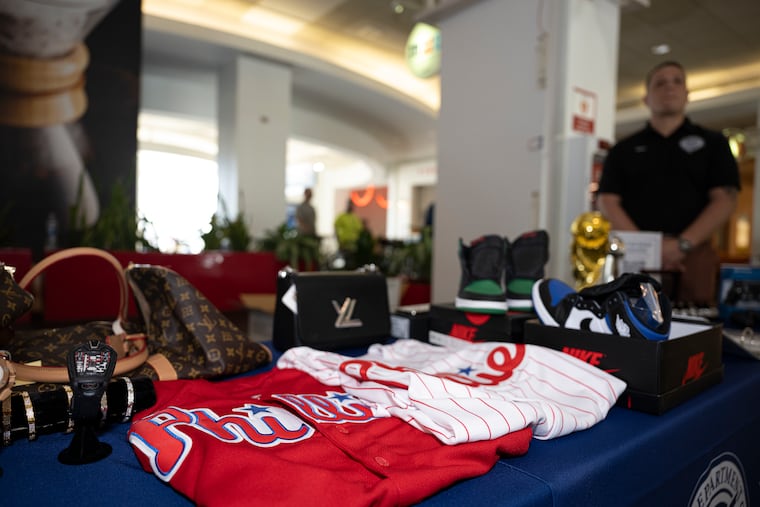Condoms, Phillies jerseys, and Botox are among counterfeit goods recently seized in Philadelphia
Nearly 300 shipments containing more than $13 million in counterfeit consumer merchandise were seized by airport officials last year.

Joshua Mason has seen a lot of counterfeit items during his 18 years with U.S. Customs and Border Protection in Philadelphia.
In a Philadelphia International Airport terminal Friday, the supervisory CBP officer stood by a table of some recent counterfeit seizures: Eagles and Phillies jerseys, spark plugs, Super Bowl rings, designer handbags, a World Cup trophy, and fake IDs taken from packages destined for college towns.
Last year alone, the agency’s Baltimore Field Office, which includes Philadelphia and Wilmington, seized 287 shipments containing more than $13 million in counterfeit consumer merchandise. Across all ports nationwide, the agency seizes about $7.7 million in counterfeit goods every day.
The rise of online shopping has resulted in an influx of fake products, officials said, and has prompted the agency to intensify its educational programming around the issue, including with events like Friday’s “road show.”
“You might not think it’s a big deal, but where does that money go to on the back end,” Mason said. “And what is the quality of that merchandise and how does that affect the end user or the public?”
“I might think I’m getting a great deal on this,” he added, gesturing to the Phillies and Eagles jerseys. “I want a deal just like everybody else. But when I’m wearing that, it’s inferior. Is it giving me a rash? When I wash it, does it fall apart?”
Most of the items were seized as cargo, either from the belly of planes that landed at the airport or from ships that docked at the Philly port. The packages that are flagged as potentially counterfeit are usually larger, commercial-sized shipments that may contain hundreds of items to be distributed to U.S. consumers. Once seized, counterfeit items go through a forfeiture process, and are then destroyed.
Mason said his advice to consumers is to “go out and do your homework.”
“If I’m purchasing something, I’d go right from the source,” he added. If you go with a third-party seller, “you don’t know if they’re nefarious. You don’t know if they’re a poor actor or if they’re a legitimate company.”
Here are five of the weirdest counterfeit items seized by CBP in Philadelphia, according to Mason:
Condoms (“That’s silly to think about,” he said of the box of loose “Magnums” seized in a package from Hong Kong in 2019)
Botox
Prescription medications
Toothbrush heads
Cosmetics, like lipsticks and blush